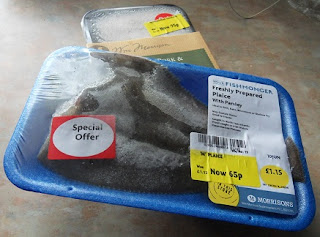Here are a few of my thrifty tips for making your food
budget stretch further.
View supermarket offers online before you shop
The major
UK
supermarkets all advertise weekly offers on their websites. Check out which fresh and frozen meats and
vegetables are heavily discounted and plan your meals around them.
Use your imagination or search the web for
recipes.
If you live in an area with more than one local supermarket,
compare the offers on their websites to decide where to do your weekly
shop. If you want to take advantage of
different offers at different stores, make sure the potential savings outweigh any transportation
costs involved.
Buy things that aren't on your shopping list
The endlessly repeated 'stick to your list' advice is only
useful for junk food junkie impulse buyers.
Actually, those types of people are unlikely to head anyone's advice
when they come face-to-face with a special on chocolate bar multi-packs!
To get nutritious food at the best possible price, you need
a flexible attitude towards shopping and meal planning. You never know what you are going to find in
the 'reduced for quick sale' bins. You
may get a chance to stock up your freezer with half price premium sausages or
salmon fillets. If you are trying to
stay within a weekly budget, this may mean changing your menu ideas on the
spot. It helps to have a wide repertoire
of recipes.
Don't assume the advertised offer is the best value
A supermarket may have a big sign indicating that a certain
package of tomatoes is a great deal at £1.
If you take the time to compare the price per kilogram with other
varieties of tomatoes, you may find a better price.
The non-advertised pack selling for £1.20
could contain 50% more tomatoes by weight.
Be sure to compare like with like
The recent years of inflation, many food manufacturers
have tried to keep their prices stable by reducing the amount of product in the
package.
Packs of bacon that used to
contain 8 rashers now contain 6.
Packs
of ground coffee that used to contain 227 grams now contain 200 grams.
If one brand stands out as cheaper than the
others, make sure it contains the same amount of product.
It could turn out to be more expensive.
Stock up on store cupboard staples
With strategic planning, you should never have to pay full
price for items with a long shelf life.
If you see a half-price or better offer on things you use that come in
jars or tins, it's time to stock your pantry.
The same is true for dry, packaged foods like pasta or pulses.
Do check the use-by date.
If it's a couple of years in the future, and
you
cook with the item on a regular basis,
fill your cupboard to the degree that your budget will allow.

No comments:
Post a Comment